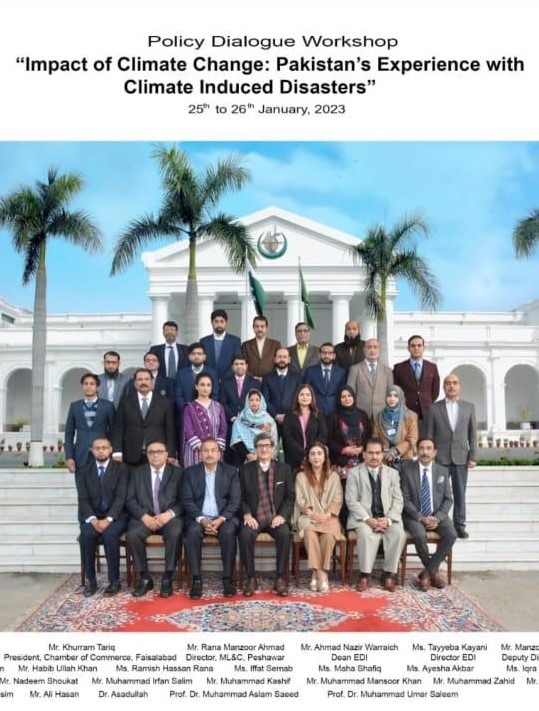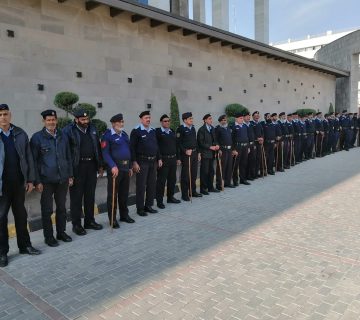LAHORE: Executive Development Institute (EDI) of the National School of Public Policy (NSPP) held Two Days’ Policy Dialogue on the Impact of Climate Change: Pakistan’s Experience with Climate–Induced Disasters on 25-26 January 2023.
The Executive Development Institute is working for the continuous professional development of personnel of the public and private sectors by organizing multiple activities of short trainings, workshops, Policy Dialogues, Seminars, and Webinars for raising awareness on topical topics of National Importance.
The dynamism of the Institute is embedded in its methodology of bringing people from various walks of life from across Pakistan belonging to public and private sectors, academia, social sector, judiciary, and civil society. The Institute identifies cutting-edge topics for sensitizing the public and government to develop action plans. This Policy Dialogue is also one of the efforts of the Institute for drawing the attention of the national community for needed actions in the backdrop of mass floods which wreaked havoc in the country.
Dean EDI, Mr. Ahmad Nazir Warraich on behalf of Dr. Ijaz Munir, Rector NSPP, formally inaugurated the Policy Dialogue and highlighted the importance of the issue. The topics include Climate Science, Sectoral Analysis of Climate, and its Impact, Financing, Diplomacy, Adaptation/Mitigation, Climate Governance, and Institutional Framework, Disaster Preparedness and Management, and Policy Actions.
The Guest Speakers were invited with domain expertise on Climate Change from across Pakistan working in climate-related public and private organizations. The learned speakers were Mr. Zafar Ali Shah (Secretary MoPD&SI), Mr. Farrukh Iqbal Khan (Pakistani Diplomat), Ms. Ayesha Khan (Founder and Head of Civil Society in Coalition for Climate Change and MGPO), Mr. Abid Qaiyum Suleri (CEO, SDPI), Mr. Rafay Alam (Environmental Law Expert), Mr. Nauman Bashir Bhatti (Pakistani Diplomat), Mr. Ahmad Nazir Warraich (Dean EDI), Dr. Imran Khalid (WWF), Mr. Muhammad Idress Mehsud Member (DRR) NDMA), Dr. Fahad Saeed(Climate Scientist/Regional Lead South Asia and Middle East), and Mr. Jourdain Vaillant (French Expert from INSP France).
The Policy Dialogue was attended by a variety of participants belonging to diverse backgrounds from Establishment Division, Press Information Department, Punjab Safe City Authority, Energy Department, Civil Aviation Authority (CAA), State Bank of Pakistan, Faisalabad Chamber of Commerce, Sui Northern Gas, Water and Sanitation Agency (WASA), University of Peshawar, University of Education Lahore, Agha Khan Foundation, Habib Bank Limited, Government of Punjab, and Government of Sindh among others.
During the dialogue, speakers discussed Pakistan’s high vulnerability of Pakistan due to its geographic positioning. It was discussed that strengthening institutional mechanisms for building resilience against climatic catastrophes is imperative for having a better preparedness and management plan. Pakistan’s responsibilities are equally important as well as drawing up the attention of the international community for fulfilling pledges made on International Forums. Although, managing financing from international multilateral donors are challenging amid various political dynamics, in such scenario, mobilization of domestic public and private resources can also help in filling up the gaps. They said that curtailing the temperature to 1.5C seems challenging. Additionally, systemic and sectoral changes can improve the institutional framework with collaborated efforts of Federal and Provincial governments with cooperation of Ministries, Line Departments, Private Organizations, Donors, and other Stakeholders. The need to have an adaptation plan was reiterated with equal emphasis on mitigation. They said that Pakistan needs a paradigm shift for considering climate as an important aspect in policy planning and decision-making to make the country resilient to climate catastrophes.
All the sessions ended with a vibrant round of question and answer sessions, which indicate the high interest of people to arrange such forums to sensitize people on such issues of national importance; where the way forward can be delineated from the expert knowledge of eminent speakers and audience equally to plan actions.
At the end Dean EDI, Mr. Ahmad Nazir Warraich thanked the keynote speaker, Mr. Zafar Ali Shah, Federal Secretary Planning, all other distinguished speakers and the participants. He also appreciated his team for their hard work.




No comment